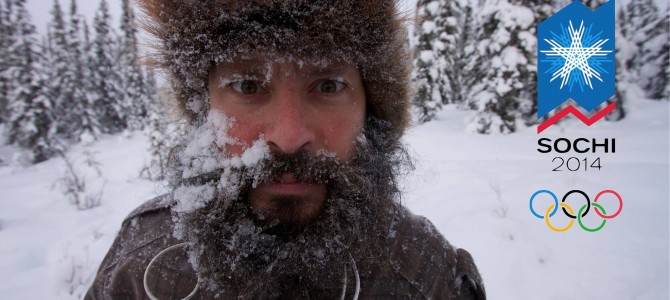A few months prior to the 2008 Summer Olympics games in Beijing, there was an Olympic torch running ceremony in the Tibetan capital of Lhasa. There, the nation’s Communist Party leader, Zhang Qingli, declared that “China’s red flag with five stars will forever flutter high above this land” before dropping a bit Jesse Myerson-ish rhetoric on folks, explaining that China would “totally smash the splittist schemes of the Dalai Lama clique.”
Qingli saw the Olympics as optimal moment to launch into some political haranguing, because the Olympics is a political event. Always has been. And sporadically, regimes in various stages of authoritarianism, say the Nazis or the Chinese Communists or the Russian Putinists, use this overhyped and overrated sporting exhibition to try and convince others of the superiority of their regimes. This is why the Germans made a spectacle in 1936, why the Soviets spent decades trying to create Ivan Dragos — and also why, the 1980 United States ice hockey victory over Soviet Union team was, for many of us, the greatest sports moment of all time.
Here’s how Charles Lane put it in a superb column detailing the uselessness of the event:
Whatever might be said for that idea in theory, it hasn’t panned out in practice. The ostensibly apolitical Games have been marred by several boycotts — of Montreal in 1976 (by African nations protesting apartheid), of Moscow in 1980 (by the United States and other Western countries protesting the Soviet invasion of Afghanistan) and of Los Angeles in 1984 (by communist countries retaliating for 1980).
The Games also have created a target for extremists, from the Palestinian terrorists who killed 11 Israeli athletes at Munich in 1972 to ultra-rightist Eric Rudolph, who placed a deadly bomb at the 1996 Summer Games in Atlanta. Consequently, these celebrations of international conviviality proceed under heavy military guard.
On the bright side, Sochi has been utter embarrassment for Vladimir Putin — or, in other words, though it’s hardly started, it’s been the rare entertaining Olympic experience. (update: Yes, this includes opening ceremonies, with its Cirque du Soleil celebration of 20th -century tyranny.)
We’ve seen an avalanche of tweets from Western journalists about the crude amenities in Sochi, the architectural challenges, the unfinished hotel rooms, the stray dogs, the yellow drinking water, the garbage, not to mention the embargo of imperialist Greek yogurt to American athletes.
Water restored, sorta. On the bright side, I now know what very dangerous face water looks like. #Sochi #unfiltered pic.twitter.com/sQWM0vYtyz
— Stacy St. Clair (@StacyStClair) February 4, 2014
People have asked me what surprised me the most here in Sochi. It’s this. Without question … it’s … THIS. pic.twitter.com/1jj05FNdCP
— Greg Wyshynski (@wyshynski) February 4, 2014
Vladimir Yakunin, a Russian plutocrat who, unlike some less vigilant magnates, knows where his black bread is buttered, groused about Western journalists who were “feeding hysteria about Russia.” Some people wondered if it was fair? Here’s Julia Ioffe at the New Republic:
There’s a fine line between fair criticism and schadenfreude, and the Western press has been largely well on the side of the latter. I’d also argue that there’s something chauvinistic, even Russophobic in it.
Russophobic? As in harboring negative prejudices, dislikes and fears about Russia and Russians? The place that gave us Dostoyevsky, Stravinsky, Solzhenitsyn and so on and on and on …? Hardly. Is it Russophobic to have a good laugh at the expense of a crooked government that squanders an estimated $50 billion on a publicity party when its per capita income is less than that of Equatorial Guinea or Gabon? A country that is 140th in on the economic freedom index, according to Heritage Foundation, slotted between Tajikistan and Burundi.
These Olympics might even end up doing the Russians a favor by bringing attention to their plight. Maybe Sochi will be seen as an event emblematic of the deeper problems in the country, As Garry Kasparov puts it:
Do not mistake the epic graft in Sochi as unusual or incidental. Corruption is the overriding principle of Putin’s 14 years in power and looting the Russian treasury and the Russian people is itself the goal. For all the foolish attempts to interpret Putin’s geopolitical strategy and personal ideology, the common denominator is always whether or not an action helps him maintain the cash flow that in turn enables him and his clique to stay in power.
We don’t even have to bring up the fact that Putin has consistently undermined American interests, abetting brutal dictatorships in Syria and North Korea – not to mention, shielding Iran’s nuclear ambitions. Surrounded by an army of 40,000 soldiers and police in a “ring of steel,” Bob Costas can whitewash his host’s misdeeds, but Russia’s government is not only corrupt, and not only is it intolerant of gays, but according to Amnesty International, human rights violations by the government include killings, enforced disappearances and torture, and they are “frequent.” According to Freedom of Information index by Reporters Without Borders, Putin belongs on a list with Chinese President Xi Jinping, North Korea’s Kim Jong-un, Iran’s Ayatollah Ali Khamenei, the Italian Mafia and Chechnya’s Ramzan Kadyrov.
That’s not to say that Russians, with or without Putin, don’t have a long way to go. It’s not to say that the Russian people don’t have their quirks. But if Sochi is, as Putin claims, a vision a “new Russia,” lots of people around the world will see that the new Russia is extraordinarily similar to the old Russia.
This is his Olympics. We should all get in a good laugh at his misfortune.
David Harsanyi is a Senior Editor at The Federalist and author of the forthcoming The People Have Spoken (and They Are Wrong): The Case Against Democracy. Follow him on Twitter.









